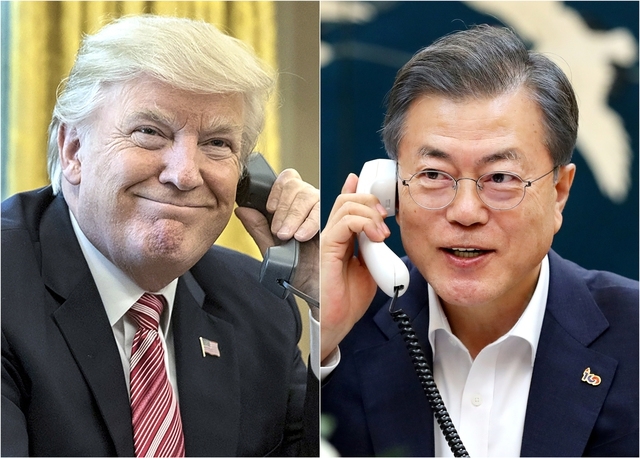Posted on : Feb.21,2019 17:18 KST
Modified on : Feb.21,2019 17:37 KST
 |
|
South Korean President Moon Jae-in and US President Donald Trump talked on the phone on Feb. 19 regarding the second North Korea-US summit.
|
On Feb. 19, South Korean President Moon Jae-in asked US President Donald Trump to “make full use of South Korea’s role in any corresponding measures that can lead North Korea to take steps toward denuclearization.” Moon said that South Korea is “prepared to connect inter-Korean roads and railroads and to carry out inter-Korean economic cooperation projects” if Trump asks it to take on that role and that “that would be a way to reduce the burden on the US.”
With easing sanctions emerging as one of the major areas of dispute leading up to the second North Korea-US summit, the next question is what results Moon will get from his appeal for Trump to take advantage of inter-Korean economic cooperation.
One striking thing about Moon’s remarks is the part about reducing the burden on the US. The US is trying to extract the maximum amount of progress toward denuclearization from North Korea in their second summit in Hanoi, including the dismantlement of the Yongbyon nuclear facilities. As a corresponding measure, the US is reportedly considering the establishment of liaison offices and an end-of-war declaration. But North Korea insists that sanctions relief must be part of the US’ corresponding measures. Not long ago, US Secretary of State Mike Pompeo remarked that “it’s our full intention of getting a good outcome in exchange for relieving those sanctions.” But because of pushback within the US, the Trump administration won’t find it easy to move ahead with easing sanctions.
That’s precisely what Moon appeared to have in mind. In other words, his remarks can be interpreted as a proposal to use inter-Korean economic cooperation as an indirect means of rewarding North Korea since easing sanctions would create liabilities for the Trump administration. But Moon is suggesting that making exemptions for inter-Korean economic cooperation would provide a way to meet North Korea’s demand while maintaining the framework of sanctions. And North Korea might also conclude that it’s being adequately compensated by inter-Korean economic cooperation projects such as resuming operations at the Kaesong Industrial Complex and tourism to Mr. Kumgang.
Moon’s remarks have come under fire from some groups who accuse him of lavishing handouts on North Korea. But that’s a red herring, since what Moon is actually offering is to use inter-Korean economic cooperation as a roundabout way to reduce pressure on the US government resulting from domestic opposition to sanctions relief. Furthermore, past experience has adequately demonstrated that economic cooperation projects benefit both South and North Korea.
The next round of working-level talks about the agenda of the second North Korea-US summit are expected to start as early as Feb. 21. We hope that the oblique approach to easing sanctions through inter-Korean economic cooperation that Moon suggested will enable North Korea and the US to reach an understanding on their main disagreements and to craft a grand bargain.
Please direct comments or questions to [english@hani.co.kr]






